John G. Messerly's Blog, page 130
December 1, 2014
What Will Life Be Like Inside A Computer?
What Will Life Be Like Inside A Computer?
Many scientists believe that we will soon be able to preserve our consciousness indefinitely. There are a number of scenarios by which this might be accomplished, but so-called mind uploading is one of the most prominent. Mind uploading refers to a hypothetical process of copying the contents of a consciousness from a brain to a computational device. This could be done by copying and transferring these contents into a computer, or by piecemeal replacement with parts of the brain gradually replaced by hardware. Either way consciousness would no longer be running on a biological brain.
I am in no position to judge the feasibility of mind uploading; experts have both praised and pilloried its viability. Nor can I judge what it would be like to live in a virtual reality, given that I don’t even know what it’s like to be a dog or another person. And I don’t know if I would have subjective experiences inside a computer, in fact we don’t know how the brain gives rise to subjective experiences. So I certainly don’t know what it would be like to exist as a simulated mind inside a computer or a robotic body. What I do know is that the Oxford philosopher and futurist Nick Bostrom has argued that there is a good chance that we live in a simulation now. And if he’s right, then you are having subjective experiences inside a computer simulation as we you read this.
But does it make sense to think a mind program could run on something other than a brain? Isn’t subjective consciousness rooted in the biological brain? Yes, for the moment our mental software runs on the brain’s hardware. But there is no necessary reason that this has to be the case. If I told you a hundred years ago that some integrated silicon circuits will come to play chess better than grandmasters, model future climate change, recognize faces and voices, and solve famous mathematical problems, you would be astonished. Today you might reply, “but computers still can’t feel emotions or taste a strawberry.” And you are right they can’t—for now. But what about a thousand years from now? What about ten thousand or a million years from now? Do you really think that in a million years the best minds will run on carbon based brains?
If you still find it astounding that minds could run on silicon chips, consider how absolutely remarkable it is that our minds run on meat! Imagine beings from another planet with cybernetic brains discovering that human brains are made of meat. That we are conscious and communicate by means of our meat brains. They would be amazed. They would find this as implausible as many of us do the idea that minds could run on silicon.
The key to understanding how mental software can run on non-biological hardware is to think of mental states not in terms of physical implementation but in terms of functions. Consider for example that one of the functions of the pancreas is to produce insulin which maintains the balance of sugar and salt in the body. It is easy to see that something else could perform this function, say a mechanical or silicon pancreas. Or consider an hourglass or an atomic clock. The function of both is to keep time yet they do this quite differently.
Analogously, if mental states are identified by their functional role then they too could be realized on other substrates, as long as the system performs the appropriate functions. In fact, once you have jettisoned the idea that your mind is a ghostly soul or a mysterious, impenetrable, non-physical substance, it is relatively easy to see that your mind program could run on something besides a brain. It is certainly easy enough to imagine self-conscious computers or intelligent aliens whose minds run on something other than biological brains. Of course there’s no way for us to know what it would be like to exist without a brain and body, but there’s no convincing reason to think one couldn’t have subjective experiences without physicality. Perhaps our experiences would be even richer without a brain and body.
We have so far ignored important philosophical questions like whether the consciousness transferred is you or just a copy of you. But I doubt that such existential worries will stop people from using technology to preserve their consciousness when oblivion is the alternative. We are changing every moment and few worry that we are only a copy of ourselves from ten years ago. We wake up every day as little more than a copy of what we were yesterday and few fret about that.
Perhaps an even more pressing concern is what one does inside a simulated reality for an indefinitely long time. This is the question recently raised by the prominent Princeton neuroscientist Michael Graziano. He argues that the question is not whether we will be able to upload our brains into a computer—he says we will—but what will become of us when we do. What will we do with all that time?
I suppose that some may get bored with eternity and prefer annihilation. Some would get bored with the heaven they say they desire. Some are bored now. So who wants to extend their consciousness so that they can love better and know more? Who wants to live long enough to have experiences that surpass our current ones in unimaginable ways? The answer is … many of us do. Many of us aren’t bored so easily. And if we get bored we can always delete the program.
November 30, 2014
How Science Can Make Us Immortal

I and many other scientists now believe that in around twenty years we will have the means to reprogram our bodies’ stone-age software so we can halt, then reverse, aging. Then nanotechnology will let us live forever. ~ Ray Kurzweil
How Science Will Make Us Immortal
If death is our end, then all we can do is die and hope for the best. But perhaps we don’t have to die. Many respectable scientists now believe that humans can overcome death and achieve immortality through the use of future technologies. But how will we do this?
The first way we might achieve physical immortality is by conquering our biological limitations—we age, become diseased, and suffer trauma. Aging research, while woefully underfunded, has yielded positive results. Average life expectancies have tripled since ancient times, increased by more than fifty percent in the industrial world in the last hundred years, and most scientists think we will continue to extend our life-spans. We know that we can further increase our life-span by restricting calories, and we increasingly understand the role that telomeres play in the aging process. We also know that certain jellyfish and bacteria are essentially immortal, and the bristlecone pine may be as well. There is no thermodynamic necessity for senescence—aging is presumed to be a byproduct of evolution —although why mortality should be selected for remains a mystery. There are reputable scientists who believe we can conquer aging altogether—in the next few decades with sufficient investment—most notably the Cambridge researcher Aubrey de Grey.
If we do unlock the secrets of aging, we will simultaneously defeat many other diseases as well, since so many of them are symptoms of aging. Many researches now consider aging itself to be a disease which progresses as you age. There are a number of strategies that could render disease mostly inconsequential. Nanotechnology may give us nanobot cell-repair machines and robotic blood cells; biotechnology may supply replacement tissues and organs; genetics may offer genetic medicine and engineering; and full-fledge genetic engineering could make us impervious to disease.
Trauma is a more intransigent problem from the biological perspective, although it too could be defeated through some combination of cloning, regenerative medicine, and genetic engineering. We can even imagine that your physicality could be recreated from a bit of your DNA, and other technologies could then fast forward your regenerated body to the age of your traumatic death, where a backup file with all your experiences and memories would be implanted in your brain. Even the dead may be resuscitated if they have undergone the process of cryonics—preserving organisms at very low temperatures in glass-like states. Ideally these clinically dead would be brought back to life when future technology was sufficiently advanced. This may now be science fiction, but if nanotechnology fulfills its promise there is a reasonably good chance that cryonics will be successful.
In addition to biological strategies for eliminating death, there are a number of technological scenarios for immortality which utilize advanced brain scanning techniques, artificial intelligence, and robotics. The most prominent scenarios have been advanced by the renowned futurist Ray Kurzweil and the roboticist Hans Moravec. Both have argued that the exponential growth of computing power in combination with advances in other technologies will make it possible to upload the contents of one’s consciousness into a virtual reality. This could be accomplished by cybernetics, whereby hardware would be gradually installed in the brain until the entire brain was running on that hardware, or via scanning the brain and simulating or transferring its contents to a computer with sufficient artificial intelligence. Either way we would no longer be living in a physical world.
In fact we may already be living in a computer simulation. The Oxford philosopher and futurist Nick Bostrom has argued that advanced civilizations may have created computer simulations containing individuals with artificial intelligence and, if they have, we might unknowingly be in such a simulation. Bostrom concludes that one of the following must be the case: civilizations never have the technology to run simulations; they have the technology but decided not to use it; or we almost certainly live in a simulation.
If one doesn’t like the idea of being immortal in a virtual reality—or one doesn’t like the idea that they may already be in one now—one could upload one’s brain to a genetically engineered body if they liked the feel of flesh, or to a robotic body if they liked the feel of silicon or whatever materials comprised the robotic body. MIT’s Rodney Brooks envisions the merger of human flesh and machines, whereby humans slowly incorporate technology into their bodies, thus becoming more machine-like and indestructible. So a cyborg future may await us.
The rationale underlying most of these speculative scenarios has to do with adopting an evolutionary perspective. Once one embraces that perspective, it is not difficult to imagine that our descendants will resemble us about as much as we do the amino acids from which we sprang. Our knowledge is growing exponentially and, given eons of time for future innovation, it easy to envisage that humans will defeat death and evolve in unimaginable ways. For the skeptics, remember that our evolution is no longer moved by the painstakingly slow process of Darwinian evolution—where bodies exchange information through genes—but by cultural evolution—where brains exchange information through memes. The most prominent feature cultural evolution is the exponentially increasing pace of technological evolution—an evolution that may soon culminate in a technological singularity.
The technological singularity, an idea first proposed by the mathematician Vernor Vinge, refers to the hypothetical future emergence of greater than human intelligence. Since the capabilities of such intelligences is difficult for our minds to comprehend, the singularity is seen as an event horizon beyond which the future becomes nearly impossible to understand or predict. Nevertheless we may surmise that this intelligence explosion will lead to increasingly powerful minds for which the problem of death will be solvable. Science may well vanquish death—quit possibly in the lifetime of some of my readers.
But why conquer death? Why is death bad? It is bad because it ends something which at its best is beautiful; bad because it puts an end to all our projects; bad because all the knowledge and wisdom of a person is lost at death; bad because of the harm it does to the living; bad because it causes people to be unconcerned about the future beyond their short lifespan; bad because it renders fully meaningful lives impossible; and bad because we know that if we had the choice, and if our lives were going well, we would choose to live on. That death is generally bad—especially for the physically, morally, and intellectually vigorous—is nearly self-evident.
Yes there are indeed fates worse than death and in some circumstances death may be welcomed. Nevertheless for most of us most of the time, death is one of the worst fates that can befall us. That is why we think that suicide and murder and starvation are tragic. That is why we cry at the funerals of those we love.
Our lives are not our own if they can be taken from us without our consent. We are not truly free unless we decide whether to live or die.

November 28, 2014
The Words and Music of Dan Fogelberg (1951 – 2007)
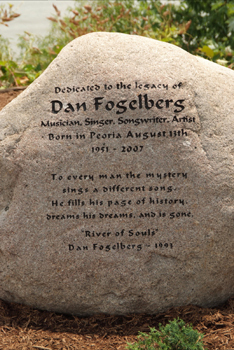
A Stone at the Dan Fogelberg Memorial Park on the Illinois River in Peoria, IL.
A few weeks ago I wrote a post about an especially moving song about death by the American musician Dan Fogelberg. His deep lyrics often touch on existential themes. Here are some more of his beautiful words and music.
Part of the Plan
I have these moments, all steady and strong
I’m feeling so holy and humble
The next thing I know, I’m all worried and weak
And I feel myself starting to crumble
The meanings get lost and the teachings get tossed
And you don’t know what you’re going to do next
You wait for the sun but it never quite comes
Some kind of message comes through to you
Some kind of message comes through
And it says to you
Love when you can
Cry when you have to
Be who you must that’s a part of the plan
Await your arrival
With simple survival
And one day we’ll all understand
One day we’ll all understand
One day we’ll all understand
…
There is no Eden or heavenly gates
That you’re gonna make it to one day
But all of the answers you seek can be found
In the dreams that you dream on the way
The Leader of the Band (a tribute to his father)
An only child alone and wild
A cabinet maker’s son
His hands were meant for different work
And his heart was known to none
He left his home and went his lone
And solitary way
And he gave to me
A gift I know I never can repay
A quiet man of music
Denied a simpler fate
He tried to be a soldier once
But his music wouldn’t wait
He earned his love through discipline
A thundering, velvet hand
His gentle means of sculpting souls
Took me years to understand
…
I thank you for the music
And your stories of the road
I thank you for the freedom
When it came my time to go
I thank you for the kindness
And the times when you got tough
And, papa, I don’t think
I said, “I love you” near enough
The leader of the band is tired
And his eyes are growing old
But his blood runs through my instrument
And his song is in my soul
My life has been a poor attempt
To imitate the man
I’m just a living legacy
To the leader of the band
I am the living legacy
To the leader of the band
Heart Hotels
Well there’s too many windows in this old hotel
And rooms filled with reckless pride
And the walls have grown sturdy and the halls have worn well
But there is nobody living inside, nobody living inside
Gonna pull in the shutters on this heart of mine
Roll up the carpets and pull in the blinds
And retreat to the chambers that I left behind
In hopes there’s still may be love left to find, still may be love left to find
Seek inspiration in daily affairs
Now you soul is improper and requires repairs
And the voices you hear at the top of the stairs
Are only echoes of unanswered prayers, echoes of unanswered prayers
Well there’s too many windows in this old hotel
And rooms filled with reckless pride
And the walls have grown sturdy and the halls have worn well
But there is nobody living inside, nobody living inside.
Along The Road
Joy at the start
Fear in the journey
Joy in the coming home
A part of the heart gets lost in the learning
Somewhere along the road
Along the road your path may wander
A pilgrim’s faith may fail
Absence makes the heart grow fonder
Darkness obscures the trail
Cursing the quest
Courting disaster
Measureless nights forebode
Moments of rest
Glimpses of laughter
Are treasured along the road
Along the road your steps may stumble
Your thoughts may start to stray
But through it all a heart held humble
Levels and lights your way
Joy at the start
Fear in the journey
Joy in the coming home
A part of the heart gets lost in the learning
Somewhere along the road
Somewhere along the road
Somewhere along the road
Dan Fogelberg Memorial Park, Peoria Illinois.

November 27, 2014
The Brain is wider than the Sky
The Brain—is wider than the Sky—
For—put them side by side—
The one the other will contain
With ease—and You—beside—
The Brain is deeper than the sea—
For—hold them—Blue to Blue—
The one the other will absorb—
As Sponges—Buckets—do—
The Brain is just the weight of God—
For—Heft them—Pound for Pound—
And they will differ—if they do—
As Syllable from Sound—

Emily Dickinson (1830 -1886) was born, died, and is buried in Amherst, Massachusetts, USA. As she wrote:
Because I could not stop for Death –
He kindly stopped for me –
The Carriage held but just Ourselves –
And Immortality …

November 26, 2014
Theories of Human Nature: Chapter 23 – Darwin – Part 3
Evolutionary Theory, Stage III: The Return to Human Nature
Genes and Memes – Throughout the 1960s and 1970s evolutionary was further confirmed and understood at greater depths than ever before. Mathematical insights shed light on adaptation, kin selection [altruism toward close relatives], reciprocal altruism [directed toward away from relatives even toward other species], and the relevance of game theory to evolving populations [for example, non-human animals often find themselves in situations with the structure of a prisoner’s dilemma.]
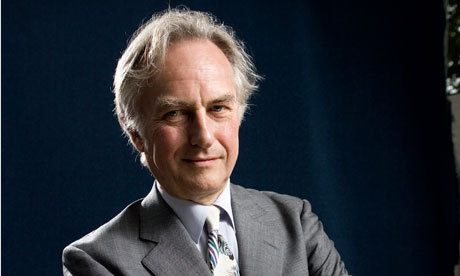 Richard Dawkins
Richard Dawkins
This research meant that evolution could be understood at the level of the gene, an idea popularized by Richard Dawkins in his famous book, The Selfish Gene . The very title of the book helps us see evolution in terms of the competition of genes trying to survive. [With today’s mathematical modeling we can understand this in great detail.] At the end of the book Dawkins argued that culture evolves analogously to biology only much faster. The elements of culture that are selected for are ideas, beliefs, practices, fashions, etc. Dawkins called these “memes.” Some memes catch on and survive–say a belief in gods or immortality or wings for aircraft—while others go extinct—like the idea of celibacy for everyone or wings attached to your arms. Like genes, memes are transferred from person to person, only rather than being transferred from one body to another they are transfer from one brain to another. This means you can spread memes must faster than you can spread genes. Cultural evolution is very fast while biological evolution proceeds very slowly. [Cultural evolution also seems to be guided by Lamarckian “inheritance of acquired characteristics.” You inherit your religious or sports team loyalties from say your parents, who acquired them.]
. The very title of the book helps us see evolution in terms of the competition of genes trying to survive. [With today’s mathematical modeling we can understand this in great detail.] At the end of the book Dawkins argued that culture evolves analogously to biology only much faster. The elements of culture that are selected for are ideas, beliefs, practices, fashions, etc. Dawkins called these “memes.” Some memes catch on and survive–say a belief in gods or immortality or wings for aircraft—while others go extinct—like the idea of celibacy for everyone or wings attached to your arms. Like genes, memes are transferred from person to person, only rather than being transferred from one body to another they are transfer from one brain to another. This means you can spread memes must faster than you can spread genes. Cultural evolution is very fast while biological evolution proceeds very slowly. [Cultural evolution also seems to be guided by Lamarckian “inheritance of acquired characteristics.” You inherit your religious or sports team loyalties from say your parents, who acquired them.]
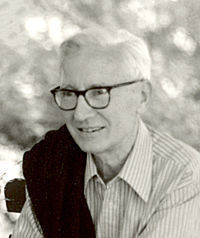 Niko Tinbergen
Niko Tinbergen
The Rise of Ethology – In the mid-twentieth century a new discipline arose, ethology, which studies animal behavior in its natural environment. The key finding was that much behavior is physiologically innate or hard-wired. Many behaviors in animals can’t be explained by environmental conditioning. They exist independent of experience or learning, they are fixed. It seems evolution has designed species-wide behaviors. Regarding animal behavior, the great ethologist Niko Tinbergen asked four questions and provided answers to each.
1) What is the internal physiological cause of a behavior? Answer. Muscle contractions, hormone secretions, etc.
2) What development or experience of the individual prepared the way for that behavior? Answer. Fetal development, growth patterns like hormone changes, or previous learning.
3) What is the function of the behavior? Answer. To survive, reproduce, escape predators, reinforce pair-bonds, etc.
4) What is the evolutionary history of the behavior? Answer. Sometimes the function of behaviors changes over time, and ethologists try to distinguish 3 form 4.
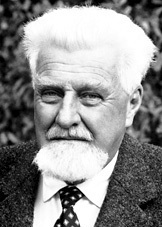 Konrad Lorenz
Konrad Lorenz
Konrad Lorenz (1903 -1989) became famous for studying animal behavior, especially the imprinting of ducks to the first moving thing they see. He assumed imprinting was an innate feature of many animals, but he reached this conclusion too easily—how does one know which traits are learned and which are innate? Moreover if an anti-social behavior is innate, can it be eradicated or are we stuck with it? Lorenz did believe in group selection, but as we have seen the level or levels at which selection operates is still open to debate.
[image error] Noam Chomsky
Chomsky and Cognitive Psychology – While B.F. Skinner thought that language could be explained by the social environment, the linguist Noam Chomsky showed that human facility with language is different from other animal behaviors. All normal humans can learn language and no animal language approaches the complexity of human language. Even chimps who use sign language fall far short of human language. Chomsky famously argued that the speed at which infants learn language and grammatical rules suggests that a capacity for language is innate. There is a universal human grammar, and it is a result of our evolutionary history. [This has been the most influential idea in 20th century linguistics.] In short, our facility with language is an evolutionary adaptation, a feature selected for in our long evolutionary history. Language aids survival. Today research on this topic is pursued by linguists, neuroscientists, and evolutionary biologists.
[Today Chomsky is known mostly as a political philosopher and social critic, especially as a critic of American domestic and foreign policy. Despite writing voluminously on political topics, despite a fearless desire to debate anyone, anywhere, you will almost never see him on TV or noted in the mass media. His ideas are generally censored from the masses. Here is a collection of his essays: Masters of Mankind: Essays and Lectures, 1969-2013 ]
]
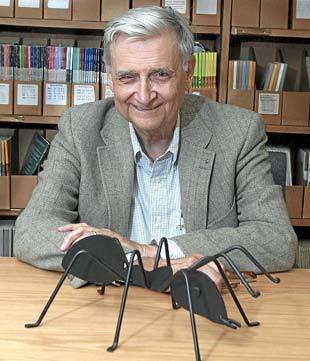 E. O. Wilson
E. O. Wilson
E. O. Wilson and Sociobiology – But if language has a strong evolutionary component, then wouldn’t other human behaviors? The Harvard biologist E. O. Wilson was the first to argue convincingly and vehemently that the humanities and social sciences can be reduced to biology, and that all this leads to the new science of sociobiology. In his Pulitzer Prize-winning book, On Human Nature, Wilson offers biological explanations for human social behaviors like aggression, sex, ethics, and religion. [I think this is one of the most important books of the 20th century. And it is eminently readable.] Needless to say Wilson’s ideas have provoked controversy, especially from social scientists who don’t want to believe their fields can be biologized. Moreover they fear that Wilson’s views give support to those who would misuse them for racist or sexist views. Even some biologists believe he is underestimating the influence of culture. The political implications of Wilson’s theories are thought by some to be so controversial, that this grey-haired grandfather once had a bucket of water dumped on his head at a conference!
But Wilson’s detractors were wrong. He clearly saw that both biology and culture as influential on human nature, and he made this clear to anyone who read his books carefully. In fact he wrote an entire book on gene-culture coevolution. Still he may have been right when he said that, for the moment, “genes hold culture on a leash.” We are not that far removed from our evolutionary past; its imprint is apparent in our behaviors.
Cosmides/Tooby and the Integrated Causal Model – What Wilson called sociobiology goes by other names like evolutionary psychology or evolutionary anthropology. This school of thought applies Darwinian insights to the human mind and human behaviors. Key premises are: 1) universal human nature refers primarily to evolved psychological mechanisms; 2) these mechanisms are adaptations selected for over many generations that helped us survive and reproduce, (remember though what was formerly adaptive and what is now adapted can be different—going to college may now be adaptive, aggression may no longer be); 3) our minds contain adaptations from distant ancestors, all the way back to the Pleistocene. This final point has been challenged by evidence that genes may evolve faster than previously thought.
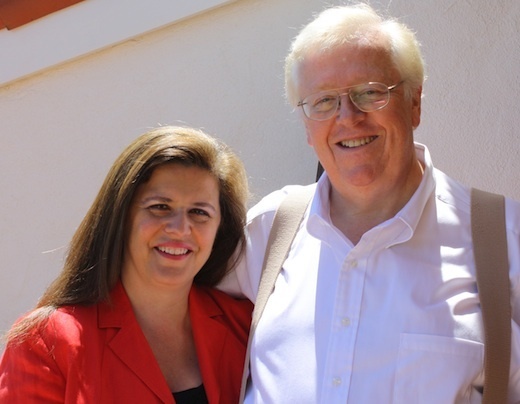 Cosmides and Tooby
Cosmides and Tooby
Cosmides and Tooby, an anthropologist and psychologist respectively, also critique the standard social science emphasis on the environmental factors. Because social scientists fear racist and sexist ideologies, they argue, they have been blind to the overwhelming evidence for evolutionarily produced cognitive mechanisms. Like Wilson they propose that a complex web of causal factors produced human nature. Behind any human phenomena is 1) natural selection operating over eons of time producing innate cognitive structures; 2) historical development; 3) unique genes as the result of sexual reproduction; 4) physical, cultural, and social environments; and 5) information processing which leads to beliefs and desires.
What all this means is that there are innate mental modules resulting from natural selection that operated on our distant ancestors, especially regarding factors relevant to reproductive fitness like perception, language, cooperation, mate selection, parental care. [The best person to read, that I know of, on the overall issue is Steven Pinker. The best person to read, that I know of, about the biology of sex and mating is Susan Fischer.] Still all of this is open to further investigation and, if you don’t like this take remember, things can change. Human nature is complex and there is much more to be learned.
We’ll end with two quotes from Darwin himself:
[Humans in their] arrogance think [themselves] a great work worthy the interposition of a deity. More humble and I think truer to consider [them] created from animals.
There is grandeur in this view of life, with its several powers, having been originally breathed into a few forms or into one; and that, whilst this planet has gone cycling on according to the fixed law of gravity, from so simple a beginning endless forms most beautiful and most wonderful have been, and are being, evolved.

Charles Darwin and his wife Emma Wedgewood
November 25, 2014
Theories of Human Nature: Chapter 22 – Darwin – Part 2
Evolutionary Theory, Stage II: The Reaction Against Biological Accounts of Human Nature
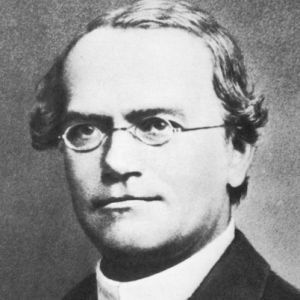 Gregor Mendel
Gregor Mendel
The Genetic Basis of Heredity – Darwin knew that there are variations between individuals and that these variations are inherited, but he didn’t know the mechanism of inheritance. This mechanism was discovered by Gregor Mendel who figured out that distinct casual factors—what we call genes—are passed from parents to offspring. We now know that sometimes genes change or mutate randomly, which accounts for genetic variation. Putting Mendelian genetics together with Darwinian natural selection along with precise mathematically modeling resulted in the “modern synthesis.” [This feat accomplished during the 1930s and 1940s is one of the greatest scientific achievements of all time.] To make the ideas even stronger, the biochemical basis of gene copying was uncovered with the discovery of DNA in 1953 by Crick and Watson. This ushered in the era of molecular biology, so that we now understand evolution at a molecular level that Darwin couldn’t imagine. Today, in laboratories around the world, biological evolution is confirmed over and over every single day! Over and over and over; day after day after day!
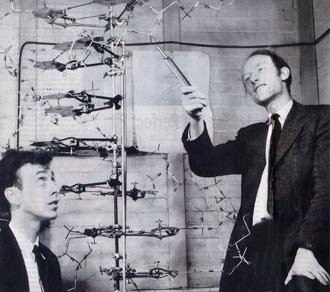 Crick & Watson
Crick & Watson
Eugenics, Racism, and Sexism – Many were led to the conclusion that evolution implied that there are innate differences between individuals, sexes, or races. Perhaps this implies that we should let the physically or mentally weak die or at least keep them from breeding. This led to the idea of eugenics, the study of how to produce fit offspring. In the early twentieth century much of the western world was enamored with this idea. Yet even if this was ethically acceptable, it is practically impossible to know who has “bad” genes. Moreover such judgments, as Darwin himself realized, were sociological not biological. What we call different races are all the same species. Racism and sexism all emanate from prejudice against groups with no biological justification for such prejudice. [Race is not a justifiable biological concept. More genetic diversity exists within populations than between them.]
The Reaction in Favor of Culture and Education: Intelligence Tests, Sociology, and Anthropology – Many went further to suggest that woman and some racial groups were intellectually inferior to white men. But this raises a number of questions. Is there some single thing called intelligence that can be measured? Even if there were how would it be measured. Are there different kinds of intelligence, say social or moral intelligence as compared to simply being good at math or language? And even if we had tests to measure this supposed intelligence how do we know if the results are due to innate ability or social opportunities? Today the whole idea of intelligence measurement is controversial.
Moreover the burgeoning social sciences of the 19th century placed more emphasis on the influence of culture rather than biology to explain human behavior. (With the exception of some basic biological functioning.) Social scientists generally say that facts about human beings are: 1) physical; 2) psychological; and 3) social/cultural. Most importantly social facts are not reducible to psychological or physical facts. This means that social facts really exist just as physical things do. [There really are such things as sub-cultures or societies.] Social facts are facts about wholes that cannot be reduced to their parts. [Society is not just a collection of individuals.] The social world strongly affects the individual. Culture is not reducible to biology. [If you were raised in a non-English speaking culture, you would probably not have learned English.] However none of this implies cultural relativism. Some cultures may be better than others, at least in certain ways.
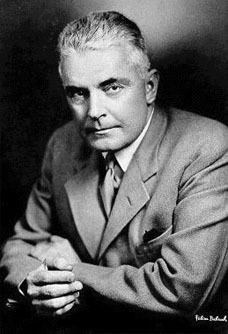 John B. Watson
John B. Watson
The Reaction Against Instinct Theory: Behaviorist Psychology – There was also a reaction against supposedly Darwinian ideas in psychology, especially the idea of instincts. To put psychology on a more scientific basis John B. Watson (1878-1958) proposed that psychology study observable behaviors and reject appeal to vague notions like instincts, intentions, or other mental states. He was so adamant about the influence of the environment that he thought he could make any healthy child a world-class scholar, musician, or athlete if the right environment were provided. This program was carried forth by B.F. Skinner (1904 – 1990) at Harvard. Skinner argued the environment selects behaviors by rewarding them, or eliminates behaviors by punishing them. [Classical and operate conditioning.] In other words Skinner emphasized that behavior was explained by environmental causes. While there is some truth in all this, studies of identical twins reared apart—who share identical genomes—reveal the strong influence on the biological as compared to the environmental.
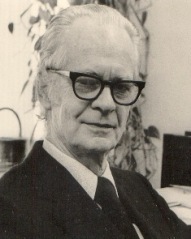 B.F. Skinner
B.F. Skinner
Because of the perversions of social Darwinism, racism, sexism and all the other immoral ideas attached to Darwinism, the biology of human nature was ignored until the 1960s. And while we acknowledge the horrors of racism and sexism and social Darwinism, we should also not ignore facts about our biology. In the last few decades, a new wave of thinkers rediscovered and extended the Darwinian paradigm further than Darwin could ever imagine. They have brought about a scientific revolution. We now turn to these ideas.
November 24, 2014
Theories of Human Nature: Chapter 21 – Darwin – Part 1
(I am teaching the course “Philosophy of the Human Person” at a local university. These are my notes of the primary text for the course, Twelve Theories of Human Nature. )
Darwinian Theories of Human Nature
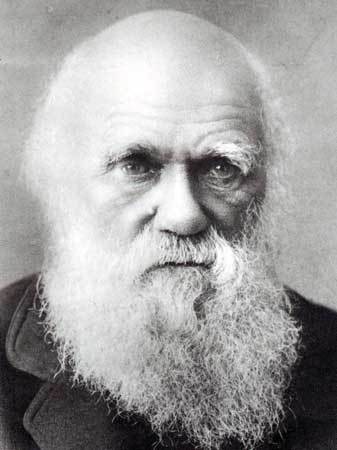
What does modern biology say about human nature? To understand the answer to this question let us look the history of evolutionary ideas.
Evolutionary Theory, Stage I: Darwin and his Contemporaries – Before Darwin came along scientists in the 18th and 19th century realized the world was much older than the Judeo-Christian tradition had assumed. Geologists like Charles Lyell realized that layers of rocks or soil were formed by processes like eruption, sedimentation, and erosion over vast periods of time. Scientists before Darwin had also discovered fossils of creatures that no longer existed. Many thinkers, including Darwin’s Grandfather Erasmus Darwin, had realized that the organisms that exist now had come from predecessors through a series of small changes. [Even some pre-Socratic philosophers had theories of evolution.]
Darwin on Natural Selection – Of course it is one thing to realize that something had happened but quite another to show how it had happened. What Darwin realized was that natural selection was the mechanism for evolution. The most prominent theory about how this had happened before was Lamarck’s theory. Lamarck believed in the “inheritance of acquired characteristics.” If animals, for example, stretch their necks they might pass on long necks to their offspring. [Or if you lift weights you might pass on your muscles to your offspring.] Darwin, who came to Cambridge to study first medicine and then theology, found himself most fascinated with biology and geology—which led to his getting a position as the naturalist about the HMS Beagle on its five-year trip around the world.
During his excursion he found bones of huge, extinct animals, the fossilized remains of sea creatures, an earthquake in Chile that uplifted earth, and other evidence of the processes of geological change. And of course he saw the birds and other animals in the Galapagos Islands, which were similar to those of the mainland but differed from one island to another. Even the beaks of little finches differed from one island to the other, in each case so as to help them get food on that island. Shortly after his return to England he came up with the idea of natural selection, but he did not publish the idea for almost twenty years since they were so controversial. Finally, after Alfred Wallace had arrived at the same conclusions, his friends encouraged him to publish so that he could get the credit.
The basic idea of evolution can be logically deduced from 4 basic empirical facts:
1) Variation of traits exists among individuals in a given species [look at other humans]
2) Traits of parents are passed on to offspring [look at people’s parents]
You can easily see both of the above by looking around you. This is how we have bred animals and plants for thousands of years. Just like humans artificially select to modify species—hence all those different dogs walking around—so too does nature select. And that’s called natural selection. Here are the other two facts:
3) The population of a species can increase quickly, and
4) An environment’s resources typically cannot support such increases.
Fact #3 can be confirmed when you realize that any pair of organisms can produce more than two offspring, in some cases thousands of offspring. Along with fact #4, this means that only a small portion of offspring reach maturity and reproduce, and that there is a competition to survive and reproduce. Given fact #1 we can logically infer that some individuals, because of their differences, have a better chance to survive and leave offspring than other individuals. Thus the traits of those individuals that reproduce will be passed on. This means that the characteristic of populations gradually change and, given enough time, this will lead to new species. All you need is natural selection working on individuals with different traits. (Darwin also recognized sexual selection, the process of selecting for traits that help individuals reproduce—color of birds, antlers of the stag, or a peacock’s tail.)The Origin of Species is basically 700 pages of evidence to support his logical inference—evidence from selective breeding, natural history, paleontology, and more.
Darwin on Human Evolution – While others immediately saw the implications of his theory for human bodies, Darwin waited another 12 years to publish The Descent of Man. In it he used anatomical, medical, embryological, and behavioral evidence to support the thesis that the human body has a common ancestry with other animals. Today biological evolution is acknowledged as a fact beyond any reasonable doubt by biologists. The overwhelming evidence for this today comes from literally dozens of sciences including but not limited to: comparative anatomy, botany, embryology, biochemistry, genetics, anthropology, geology, molecular biology, chemistry, mathematics, population ecology, zoology, and more. This is as well established as anything in science.
[Evolution is as well established as that gravity or atoms exist! It is every bit as certain as that the earth is (roughly) round and goes around the sun! Anyone who tells you that evolution is false is either a) lying; or b) scientifically illiterate. The only way to imagine it is false is if intelligent aliens or deceptive gods are playing tricks with our minds! But you don’t have to trust me. Here is a link to a statement on the issue from the National Academy of Sciences, the most important scientific body in the world. You could also visit hundreds of other scientific websites to confirm this claim. Even better, major in biology at a good university and you can learn to understand this fact first hand. ]
Social Darwinism – But what are the social, ethical, or religious implications of the theory? Specifically, can a scientific fact imply anything about values? Can you get an ought from an is? It seems not. For example, it may be a scientific fact that penicillin cures certain bacterial infections, but that doesn’t mean that you ought to take penicillin (unless you value health.) Or it may be a fact that large amounts of energy are released when we split atoms, but that doesn’t imply that you ought to split atoms. Similarly the fact of evolution doesn’t tell us what we ought to do. (Defenders of this view say that those who think you can get facts from values commit the naturalistic fallacy.)
Still others say that since evolution implies the most biologically fit survive and reproduce, and since biological success might be thought of as the ultimate value, those who survive must be the most valuable. They take Darwinism to imply that we should do everything we can to survive, that greed is good, etc. [Not surprisingly Ayn Rand, the matron of today’s Republican Party in the USA, titled her work on ethics: The Virtue of Selfishness.] In other words those who survive are not the biological fittest, but basically the fittest in a larger sense. [In the USA today this is generally taken to mean those with the most money.]
This also implies that charity, health-care, social security, public education, child care, etc are pointless. You must let the inferior die; they cannot possibly be as valuable as the idle rich! Many thinkers in the USA in the 19th century adopted this attitude, and it was as common among the robber barons at that time as it is among large elements of today’s Republican Party in America. It advocates competition to weed out the 47% who are Ayn Rand’s or Mitt Romney’s or US Senator Paul Ryan’s moochers. It is but a small step from social Darwinism to racism and genocide. But it doesn’t follow that those who are biologically fit—like cockroaches—are morally, artistically, intellectually, spiritually, or psychologically fit. Those who have the most children or the most money aren’t necessarily the best in other ways. And social Darwinism was not Darwin’s idea, nor did he subscribe to it. The idea came from the philosopher Herbert Spencer, and was embraced by the wealthy in America in the 19th century, as it still in large part is. [How ironic that so many of the opponents of biological Darwinism in the American political arena, primarily from the right, are supporters of social Darwinism. They disbelieve what we know to be true, and believe what we know to be false.]
Darwin’s Own Values – Darwin suggested that not only had human bodies evolved from lower forms, but so too had our intelligence, language, emotions, morality and religion. [Today we know that Darwin was right about all this. He was, I believe, the most important human being who has yet lived.] Darwin knew he was speculating by extending evolution from human bodies to their minds and behaviors. And some of his ideas, especially about selection operating at the level of the group—group selection—are still matters of controversy today. [Yes there are controversies about how evolution happened, but none about that it happened.] He also realized that culture as well as biology influenced ethical values and religious beliefs. Darwin believed that human sympathy and compassion were noble. By all accounts he was a humble man, dedicated father, and affectionate husband.
The reply to social Darwinism is that evolution has given us sympathy and concern for our fellows, and the intelligence to make a just and moral world. This is every bit as natural as a survival of the fittest. But in the end the appeal to the ethics of Kant or Marx or Christianity at its best goes well beyond any biological imperative. As for religion, many pages have been spilled on the issue of Darwin’s religious beliefs. But anyone serious about discovering his views will conclude that by the end of his life he was almost certainly a closet atheist. He had come a long way from preparing for the clergy as a young man.
Charles Robert Darwin is buried in the north aisle of the nave of Westminster Abbey, not far from Sir Isaac Newton.

November 21, 2014
Theories of Human Nature: Chapter 20 – Sartre – Part 2
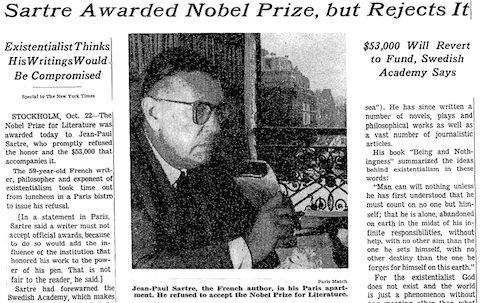
Diagnosis: Anguish and Bad Faith, Conflict with Others – Freedom brings anxiety which we try to avoid by denying our freedom. But we cannot escape freedom, we must choose, we are condemned to be free. [Think about the anxiety of choice. What job should I do? Who should I marry? Where should I live? What should I believe?] A way out of choice is to imagine we must believe this or do that, to act in bad faith in Sartre’s language. This is a kind of self-deception where we imagine that our thoughts and actions are determined when they are up to us. [You could be an axe murderer or join the Peace Corps. You could be an atheist or a join a religious order. You could do or think whatever you want.] In Sartre’s famous examples a woman acts in bad faith when she doesn’t recognize her freedom to resist a man’s advances; and the waiter acts in bad faith when he assumes, if he does, that he must act like a waiter. The woman is not an object to be seduced and the man is not essentially a waiter. Actions and beliefs are sustained by our choices.
Sartre rejects that bad faith could be explained by Freudian repression. Is there a censor in the mind that represses? If so it must decide what to repress and what not to, so it must be aware of what’s repressed so as not to be aware of it. Bad faith then describes a whole person, not some part of their mind. But to say one is sincere or has good faith is also problematic because again, we are not essentially anything. If I act gay, shy or arrogant there is still a distinction being made between the self doing the describing and the self that is described. But we cannot be described because we are not artifacts. So I am not essentially shy, gay, or arrogant. To say so is to act in bad faith. [Sartre says you choose to be gay, shy or arrogant.] While this is all perplexing, the key and best idea in Sartre is that we can always be different from we are, which is probably a good thing to believe.
Sartre does think we can justifiably infer that other people have minds. [Some thinkers argue that we can’t know this.] When others look at us we know we are being observed, hence we experience emotions like shame, embarrassment or pride. Sartre also argues that relationships between conscious people are necessarily ones of conflict. Other people look at us and objectify us, thereby threatening our freedom. In response we might try to control others by treating them as objects. So Sartre believes that Hegel was right; all human relationships are master/slave relationships that depend on differences in power. Sartre believed that master/slave relationships were expressed in sexual desires, and he also thought that we couldn’t really respect the freedom of other people. This is Sartre at his bleakest. [When you read Sartre you often feel that he just had a fight with his longtime lover, companion, and intellectual giant, Simone de Beauvoir.]
Prescription: Reflective Choice – Sartre rejected objective values—values are wholly subjective. So there is no specific way of life or course of action he can recommend. What he can do is condemn bad faith and praise making choices with an awareness that nothing determines them. This means accepting responsibility for our actions, beliefs and everything else about ourselves, while rejecting the idea that there are objective values to which we must adhere. [Sartre, following Marx, ascribes the latter to the ruling classes for whom the status quo works.]
Sartre illustrates how objective values [or ethical theories] don’t help us in situations where we must freely choose. In a famous story he asks: should a man go off to fight the Nazis or stay home and care for his mother? No moral theory, intuition, or emotion tells you what to do. You must simply exercise your freedom and choose. [To say that some moral principle forces you to do one thing or another is to act in bad faith, it denies your freedom.] Sartre is partly right that no moral theory answers every moral question, but that seems different from saying you should do whatever you want.
What Sartre says we should do is act authentically. We should act recognizing that we are free to act in many different ways, and we are responsible for our actions. Today Sartre’s assertion flies in the face of research about how much of our mental processes are unknown to us consciously. [Not to mention the influence of genes and environment on our behavior.] But Sartre maintains that to have self-knowledge entails understanding the reasons, not the causes, of our actions and beliefs. He also thinks that people must choose their own values and create their own meaning in life. But is authentic choice all there is to it? If so it would seem Sartre has to commend dedicated Nazis, compulsive child tortures, or sadists like Cheney, Yoo, Addington, Rumsfeld and other members of the George W. Bush administration who approved torture. Also, Sartre would have to condemn someone who does apparently good things because they believe in objective values. But does that make those things wrong? So an ethics which boils down to “just choose” is incomplete.
Authenticity and Freedom for Everyone – As Sartre’s thought developed he did come to see how freedom was situated within the contexts of facts about human beings—their facticity. Our freedom is limited by our bodies and our place in history and society [none of us will ever be born to Sam Walton and inherit about 20 billion dollars!] Some have the chance to go to Harvard or Oxford and become physicians or scholars, but most do not. So Sartre backtracked a bit from his claims about our radical freedom as his thought matured. He also advocated for social change. He believed that we might change the world by becoming more godlike, by seeing ourselves as the only source of salvation and meaning in this world.
Sartre also came to believe that relationships with others could be authentic. If others sees you as free, they give some meaning to your life through that recognition. He even argues there can be authentic love. [Perhaps he was experiencing the wisdom and maturity that comes with age.] Still his most basic value was freedom, but not just the freedom that conscious beings have when they choose, “but the value judgment that every person ought to be able to exercise his or her freedom in concrete ways, and thus that human society should be changed in the direction of making this a reality for everyone.” To be authentic is to recognize the freedom of all people. And this obtains in a socialist, classless society where “all human beings will be able to express their freedom. Thus Sartre encourages us to use our freedom to change both ourselves and the world.

November 20, 2014
Theories of Human Nature: Chapter 19 – Sartre – Part 1
(I am teaching the course “Philosophy of the Human Person” at a local university. These are my notes of the primary text for the course, Twelve Theories of Human Nature. )
Sartre: Radical Freedom
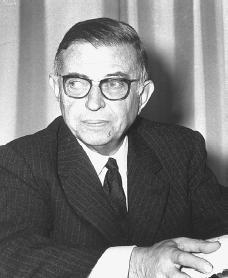
Jean-Paul Sartre (1905 -1980) was France’s most important philosopher for much of the twentieth-century as well as an important novelist and playwright. Sartre is classified as an existentialist. This means at least three things. Sartre is interested in: 1) the uniqueness of an individual life, not abstract theories about a shared human nature; 2) the meaning of life from a subjective point of view; and 3) the freedom to choose one’s projects, meanings, and values. To better grasp existentialism, here is a very brief sketch of some of a few of the philosophers who influenced Sartre.
The Danish Christian Soren Kierkegaard (1813 – 1855) is usually thought of as the first existentialist, although there is an existential dimension in many previous Christian thinkers especially Augustine and Pascal. Like Marx, Kierkegaard reacted to Hegel’s philosophy, rejecting its abstruse metaphysics and focusing instead on individuals and their choices. Kierkegaard believed people generally choose one of the following as their basic attitude toward life: 1) they searched for pleasure; 2) committed to family, work, and social responsibility; or 3) concentrated on religion and the divine. The latter life is the best but it involves taking a “leap of faith.” [Kierkegaard writes of his agony about choices and their implications as passionately as anyone.] What is most important about Kierkegaard’s thought for existentialism is its turning away from objective truth to focus on subjective consciousness.
The other seminal figure in existentialism is the atheist Friedrich Nietzsche (1844 -1900), who is famous for declaring that “god is dead.” The idea is that religion no longer plays a very significant role in western culture, we have seen through its illusions, and we need to find the meaning of life without invoking gods. Nietzsche thinks we must create our own values, we must become supermen who reject conventional, religious values [“slave morality”] and exert our will to power [“master morality”] Nietzsche investigates subjective phenomena like emotions, will and consciousness. [The most accessible introduction to existentialism that I know of is William Barrett’s Irrational Man.]
Sartre’s Life and Work – Much of Sartre’s work originates from and is influenced by his experiences as a Frenchman in Nazi occupied France. His focus on choice was surely influenced by the choice that the French faced: collaboration, resistance, or quiet self-preservation. He later became a Marxist, although he thought Marxist philosophy would benefit by emphasizing freedom. He joined the Communist Party in the early 1950s, although he left it after the Soviet invasion of Hungary in 1956. He was politically active later in life, supporting exploited workers, nascent political revolutions and condemning American aggression in Vietnam. In the first phase of his thinking, he focuses on individual freedom, and in the second, he explores the social and economic limits on human freedom. [It is if his early bedrock belief in freedom was shaken by the reality of the social and economic world.]
Metaphysics: Consciousness and Objects, Atheism – Sartre distinguishes human consciousness and inanimate non-consciousness. This is not a distinction between two different substances, it is not a mind/body dualism, but between “two modes of being.” One is the way conscious beings exist—being for itself—the other the way non-conscious things exist—being in itself. Consciousness is always about something, including sometimes itself, whereas inanimate things are not conscious. [He’s trying to get at what it is to be, to be conscious, to be human.] The other main foundation of Sartre’s thought is his thoroughgoing atheism. He assumed that there are no transcendent values, and no intrinsic meaning or purpose for our lives. Life is absurd, we are forlorn. We have to grow up and choose our own values and projects. The meaning of life isn’t something discovered, but something we create. We must give our lives meaning.
Theory of Human Nature: Existence and Essence, Negation and Freedom – Sartre doesn’t believe in a human nature or essence that precedes individuals. Rather our existence precedes our essence; we have to create our own essence. Nothing, not god or evolution, created us for any purpose other than the purposes we choose. Of course Sartre recognizes that we are biological beings, but there are no general truths about what we should or ought to be. The most basic thing we can say about humans is that they are radically free, to be anything except to not be free. [They can choose anything except choose not to choose.] In his words, we are “condemned to be free.” Consciousness is also aware that it is not the objects it ponders, that many things are not the case, and that we lack many things. The concept of nothingness or negation relates to freedom for Sartre. For the ability to conceive of what’s not the case—I could have done that—implies the freedom to imagine and choose other possibilities. In large part consciousness is this conceiving or desiring things to be different—not to be as they are. Negation implies freedom of mind and of action.”
Sartre rejects Freud’s psychic determinism as well as the idea of the unconscious. Sartre believes we choose our mental states like emotions. This may be true sometimes but other emotions, like concern and care, seem to be very much a part of our nature. He also thought that character traits are choices. I am not shy, I choose to be shy. While this may be partly true we now know enough about biology to know that it’s not the whole truth. Still Sartre thinks that our radical freedom is evident when we make resolutions. I say I won’t eat cookies starting Monday, but when Monday rolls around and I’m confronted with cookies—I face my freedom because my past resolution doesn’t constrain me. Confronting choices leads to angst or anguish. We don’t know what we will do or what to do. We can jump off a bridge, and we could throw our child off a bridge too. When we confront our freedom it brings anxiety.

November 19, 2014
Theories of Human Nature: Chapter 18 – Freud – Part 2

Prescription: Psychoanalytic Therapy – Freud hoped “that human problems could be diagnosed and ameliorated by the methods of science. His project was to restore a harmonious balance between parts of the mind and … to suggest a better balance between individuals and the social world.” Freud concentrated on the former—social reformers work on the latter—but he recognized the limits of working only with patients. Freud’s method, so well known to us today, tried to get his patients talking uninhibitedly about their past. When patients stopped talking, Freud thought he was close to some repressed memory or idea. He thought that by bringing this material to the awareness of the rational, conscious mind, one could defeat these harmful thoughts.
Freud realized this process could take years, but such “psychotherapy” could eventually bring greater harmony for troubled individuals. He also found that patients manifested strong feelings of love or hatred toward Freud himself. Thus was born the idea of “transference,” whereby emotions are projected onto the therapist. The goal of the therapy is self-knowledge. Patients may then: a) replace repression of instinctual wishes with rational self-control; b) divert them into acceptable behaviors; or c) even satisfy the wishes. But by bringing these passions to the surface one conquers them, they no longer will control the patient. [This is problematic. Might not one also become obsessed with these repressed memories or desires? Thereby allowing them even more control?] And Freud also thought that psychoanalysis could probably be applied to entire societies: “… our civilization imposes an almost intolerable pressure on us …” [For example what does it say about a country that always says it is #1 or the greatest country on earth, when by objective measures it's clearly not the best place to live, does not have the happiest people, has a very high suicide rate, has the highest incarceration rates, etc.? Might Freud say the entire culture is neurotic?]
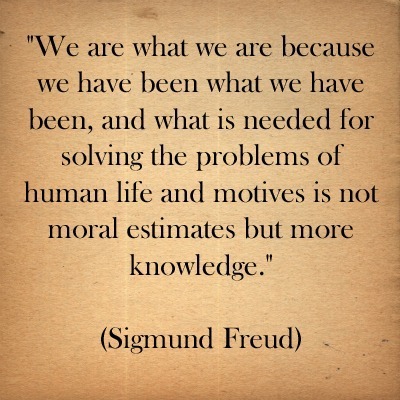
Critical Discussion: (A) Freud As Would-Be Scientist – Is psychoanalytic theory scientific? Is it effective? Is it true?
Is it effective? – It is hard to judge the effectiveness of psychoanalysis for many reasons. First understanding the causes of maladaptive behaviors or thoughts—say abuse in childhood—does not imply that one can change it. Some things may be impossible to undo and we have to accept or control them as best we can. Second even if psychoanalysis works, it might be misapplied in practice. Third what constitutes a cure is vague. Fourth how can we compare different neurotic patients, or establish control groups to compare them to? Generally we rely on anecdotal evidence about the effectiveness of therapy, which is by definition not scientific.
Is it true? – Testability is fundamental for a theory to have scientific status, so we must ask whether these theories are testable before we can know if they are true. Freud’s theorizing is speculative, going beyond the evidence, so it is not clear how it is testable. For example, Freud thought dreams were typically to be understood as wish-fulfillment. Even if this is true what are its causes? Are they mental or physical? Are dreams significant or just cognitive noise? Can we test the idea that the cause of a dream is a wish? Can we test that the unconscious is the cause of a slip of the tongue, a Freudian slip? Isn’t psychoanalytic theory just a way to understand people by interpreting meaning into what they say, do, and dream? In large part it seems so.
Is it scientific? – Now consider the idea of unconscious mental states. Is it a testable idea? Does it explain or predict human behavior? If not it is not scientific. It is similar to our attributing conscious states to explain thoughts and behaviors. [Many scientists think this is just a kind of “folk” psychology, explanations that aren’t really scientific ones.] Moreover Freud does more than just postulate unconscious states, he says the process of repression pushes thoughts into the unconscious. But who or what does this repressing? Is this another consciousness? Is there a consciousness within a consciousness? We can raise serious doubts about the scientific status of the Freudian project.
Defenders reply that psychoanalytic theory is not so much a scientific hypotheses as a hermeneutic (interpretation), a way to understand the meaning of people’s actions, words, dreams, neuroses, etc. So we shouldn’t criticize it for being less precise than physics or chemistry. People are more complicated than atoms. Perhaps interpreting people’s thoughts and behaviors is more art than science. Maybe a good psychotherapist is particularly good at understanding human motivation, they have a knack for it. Still it seems that interpretations should be backed up with evidence before we accept them as good interpretations. Perhaps this view of Freudian psychoanalysis as a hermeneutic can be supported by the distinction between reasons and causes. Perhaps the unconscious is not a physical cause but a psychological reason for behavior. Or perhaps unconscious beliefs and desires are both causes and reasons. These are deep philosophical questions.
As for Freudian drives, how many there are? How do we distinguished from one another? How do we know that some drive, say a sexual one, is behind different behaviors, say artistic expression? We can sometimes be self-destructive, but does this imply we have a death instinct? None of this is clear. The extent to which this is all scientific is problematic.
Critical Discussion: (B) Freud As Moralist – All human behaviors don’t seem driven by bodily needs. But Freud thought that our behavior shows that we operate according to “the pleasure principle.” We generally seek satisfaction of our impulses. But this makes us seem like non-human animals despite the fact that we derive satisfaction from, for example, the intellectual and artistic. Freud replied that these “satisfactions are mild” compared to eating, drinking, and sex. Moreover the higher satisfactions are available only to those with rare gifts he thought. But what of the satisfaction of friendship, parenting, music and more which are more reliable and lasting forms of satisfaction? [Both Plato or John Stuart Mill make qualitative distinctions between pleasures. Both thought the intellectual were preferable to the physical.] Perhaps Freud’s views were colored by the physical pain he endured and the world war through which he lived.
But Freud was not one to offer an overly optimistic view of reality. For example he saw “religious belief as a projection onto the universe of our childhood attitudes to our parents: we would like to believe that our Heavenly Father … is also in benevolent control of our lives …” Of course that fact that religion has its origins in childhood doesn’t mean that it’s false but Freud himself was an atheist who thought religion was generally bad for society. Freud thought religion appealed to the emotions not reason; it was an illusion created by humans because they couldn’t face the bleakness of life. It could best be understood as wish-fulfillment. We believe god, souls and immortality because we wish they are real.
Freud also believed that saintly, selfless behavior as well as artistic or scientific activity derived their energy from suppressed sexual instincts. Needless to say this biological theory of human motivation is highly speculative. Human are often bored even if their physical needs are met. But Freud thought that most humans are motivated by pleasure and thus they may need Platonic-like guardians to run the society.





